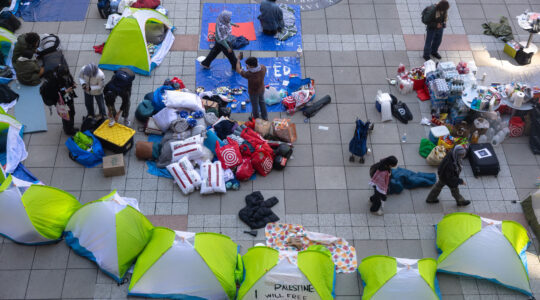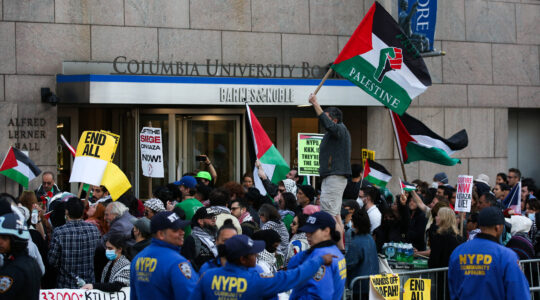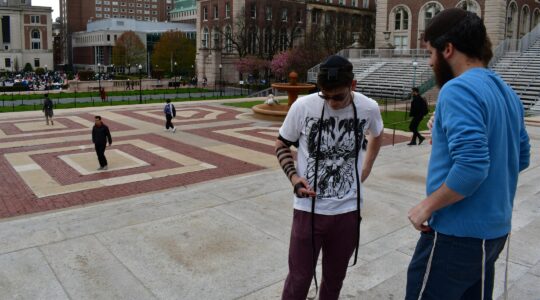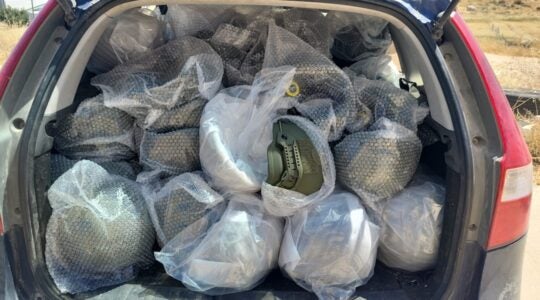Shmuley Boteach (author of "Kosher Sex"):
The Jewish community better get serious about the cancer that’s growing inside it. The devastation on Wall Street carries a lot of Jewish names, from firms like Bear Stearns and Lehman Brothers to individuals such as Bernard Madoff, whose $50 billion Ponzi scheme collapsed last week, and lawyer Marc Dreier, arrested Dec. 7 for defrauding investors of hundreds of millions of dollars.
On the Internet, more and more people who don’t like us are beginning to connect the dots, pointing out that there are an awful lot of Jews who bear responsibility for Wall Street’s fall. But that’s not what bothers me. Anti-Semites will always find something to hate us for, and I’m way too busy to worry about what a bunch of bigots think anyway.
Rather, what worries me is this: What if some of it is true? What if our community has become too obsessed with money? What if our values have become about wearing the most expensive Cartier watch and driving a souped-up Mercedes? What if a disproportionately large number of young Jews are running to work on Wall Street and never even considering jobs like teaching, the rabbinate or outreach because the compensation, comparatively, stinks?
Mark Charendoff (president of the Jewish Funders Network):
In a narrow sense, this is more catastrophic than the economic downturn because it is both sudden and irreversible to those affected. … As bad as the economic downturn is, we believe it will get better, even if it takes five years. But in this case, the money has just disappeared, in some cases in its entirety. …
We have only two choices: We can, as a community, take on more responsibility to monitor and regulate ourselves, or Congress will do it for us. And that is never a good option. …
If [the Madoff fallout] was a wake-up call, it is an awfully painful one.
Rob Eshman (editor of the L.A. Jewish Journal):
I wish Jews believed in hell, because then I could take comfort that Bernard Madoff will go there. …
There is a generation of Jews — at least one — raised on the idea that pushing paper creates real wealth. We are a generation of unbelievable materialism and indulgence, a generation that believes a 10 percent return is its birthright. We have rabbis who shut their mouths rather than risk alienating a potential donor. Sure they’ll preach tikkun olam and charity from the pulpit, but how often do they preach modesty, humility and moderation?
People are telling me the Madoff scandal all boiled down to one word — greed. But it’s not so simple. Madoff didn’t just want money, he wanted the immunity that being a big shot, a macher bestows upon all sorts of cheats, dimwits and blowhards in the Jewish community.
The questionable practices of some of our most admired charities grow out of this culture and leave me with a few unanswered questions. How is it that donor money found its way in the first place into nonguaranteed investments? What gives a 501(c)(3) the license to, in a word, gamble? Who was paying attention when chunks of charitable contributions ended up in the hands of a $50 billion firm whose auditors occupied an office smaller than mine? Why aren’t the names of every single investment vehicle in which nonprofits have significant money published online for donors to see?
Good questions, but I don’t want to spread the guilt too far just yet. I want to stay focused on the man who must take full responsibility for his crimes.
The Madoff scandal didn’t occur in a vacuum, but in the midst of a massive financial meltdown that, by itself, was shrinking funding for Jewish communal life. These dire circumstances cry out for thoughtful response, and the willingness to tackle uncomfortable questions. Should every Jewish institution remain? Have some outlived their usefulness? Should others merge?
Truth is, the American Jewish community spends most of its money on core activities — synagogues, schools, community centers, social services — and not on the more discretionary efforts that often attract mega-donors and headlines. These core activities must be sustained and strengthened, especially at a time of increased food scarcity and unemployment. The winnowing process, painful though it is, ought not to be subject to a random Darwinian exercise. There should be creative ways to keep alive the most precious and necessary enterprises.
All this calls for a return to basic codes of ethics, decency and compassion. There are Jewish villains, and also Jewish heroes. Madoff’s corrosive example must be offset by a focus on behavior not blinded by wealth and status, not incubated in a clubby, gated community or the intoxicating halls of political power, but in an environment which takes seriously the directive to be our brother’s keeper.
Abe Foxman (national director of the Anti-Defamation League):
And there are a lot of questions that have to be answered about fiduciary responsibility.
Intermountain Jewish News (editorial):
Do you want a list of the problems with federations? Since we have been critical of their dereliction on intensive Jewish education for years, we can provide one. But it may be said of the federation what Winston Churchill said of democracy. It is the worst system yet devised — except for all the alternatives. We enjoy the blessings of democracy, one of which, no doubt, is the freedom to criticize. We enjoy the blessings of federations, too — something unwisely overlooked in recent years.
This is something painfully highlighted by the recent collapse of Bernard Madoff, whose promises of pie in the sky were not just idiosyncratic. He and the people who couldn’t wait to entrust their funds to him represent an American Jewish communal failure, a corruption of values, a short-sighted drift to mythical pots of gold at the end of the rainbow. The high flying Bernard Madoff and his followers represent a malaise that the organized American Jewish community cast upon the federations. Federations? Passe. Done. Old. Yesteryear. Dying.
So we were told — and why? Because of the great “transfer of wealth” that placed inconceivable sums in the hands of individuals who, in most cases, did not earn them. So-called cowboy megadonors became the go-to people. Big bucks replaced the hard work of building community. A thirst for instant success and instant, unbelievably well endowed programs replaced community decision-making and community funding.
Good people and good foundations and good causes and good intentions were dealt a cruel and unjustified blow by a wicked man. Still, the Madoff scandal highlights something more: the unwise trend in the Jewish community over the past 15 years away from federations — away from democracy, however flawed — toward a new model that has not served our community well. With much wealth suddenly gone — $600 million in Jewish charitable funds, according to one estimate! — it is time to return to our roots. To the community table. To debates. To decisions that represent multiple voices, conflicting visions, uncomfortable compromises, but also the infrastructure and people-structure that keeps the community going.
Jennifer Laszlo Mizrahi (founder and president of The Israel Project):
Short term, the impact will be terrible. Some Jewish nonprofits will simply go away. They won’t be able to survive this. People will lose their jobs, and there are no jobs for them in this economy. Services that are critical to the Jewish community will be cut drastically. …
We’re going to see a matter of survival of the fittest. … Darwin said it is not necessarily the smartest or the strongest who survive, but those best able to adapt.
We have become very, very trusting of other members of the community. …
We’ve learned that just because somebody seems to be kosher, they’re not necessarily kosher. There’s going to have to be a lot more diligence about their investments, about how they get and handle their philanthropic funds.
Jonathan Sarna (historian, Brandeis University):
“A whole ritual of the organized Jewish community is going to end: going down to Palm Beach and Boca Raton every winter, putting on a good show for these people in the country clubs and coming back with the funds you need to run your organization. I believe that is going to end, transforming Jewish philanthropy.”
Mark Seal (veteran of several Jewish organizations)
[Maodff’s] pitch was one part technology and one part record and one part that he was a lovely guy and you felt that — it’s funny, in retrospect — you felt a certain amount of integrity. That was his presentation, in essence — his reputation and his personality.
New York Jewish Week (editorial):
Some are suggesting that we live in an age of unbridled greed and that the Jewish community, too, has become obsessed with wealth, losing its ethical principles along the way. We are reminded that once our leaders were rabbis, sages and educators, and that they have been replaced by individuals whose checkbooks may exceed their vision.
Others note that we live in an increasingly competitive world where it takes significant funding to finance the remarkable social service system that we know with pride as the Jewish community — here, in Israel and around the world. Without dollars, some say, all of our good intentions cannot be translated into action.
But those two realities are not mutually exclusive. Jewish teachings have much to tell us about balancing idealism with pragmatism, about not relying on faith to see us through a crisis. We are taught that when the Israelites, fleeing Pharaoh and his chariots, reached the Red Sea, it was only when a brave soul named Nachshon ben Aminadav stepped into the sea that the waters parted. …
A community that has joked at times about its overabundance of organizations, its alphabet soup of acronyms, may be faced with mergers and consolidations. Such moves may be a blessing in disguise, making our charities leaner and more efficient, and replacing competition with cooperation.
We need that kind of faith, commitment and courage in times like these.
Andrew Silow Carroll (editor in chief of the New Jersey Jewish News):
Rather than arming for a war against the hate groups, Jewish organizations should be devising ways to learn the lessons of the Madoff disaster, and share those lessons with their colleagues at Jewish institutions large and small.
They should be grateful for the generosity of the very wealthy, but without allowing the machers’ riches to place them above scrutiny.
The organizations’ leaders should take a long, hard look at the overlapping, and even redundant, agencies and projects in Jewish life and figure out ways to get past the turf wars and meet challenges more efficiently and effectively.
And they should realize that, on top of an already battered philanthropic world, the Madoff meltdown is causing a world of hurt. That puts the responsibility on all of us to fill in the gaps and to prop up the institutions that escaped disaster and will have to make do in a Jewish world diminished by whatever madness made Madoff do what he did.
Gary Tobin (president of the Institute for Jewish and Community Research):
Many Jewish philanthropies are dependent on high-end donors in very close social and economic networks, and this guy is right in middle of them. … It’s like finding out that your father is a felon — this is bad news for the family.





